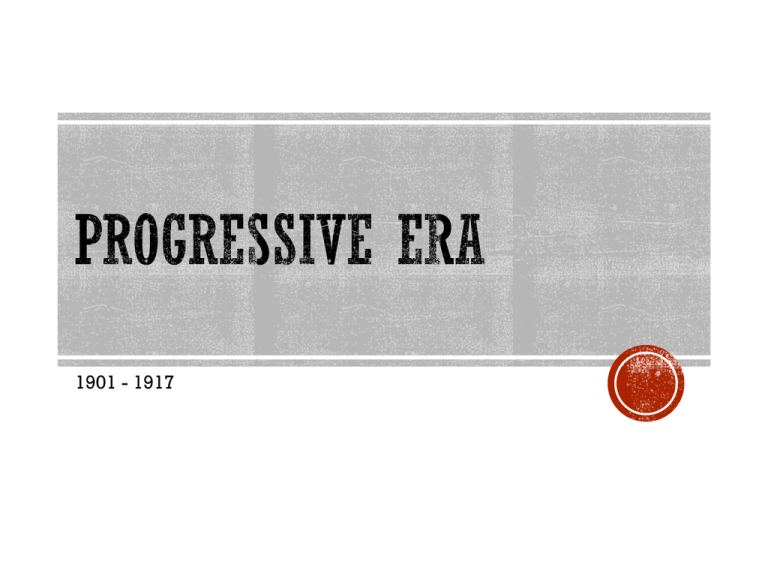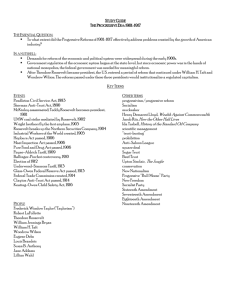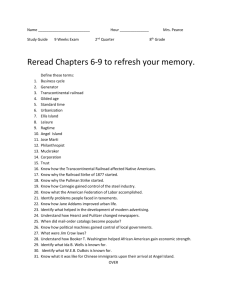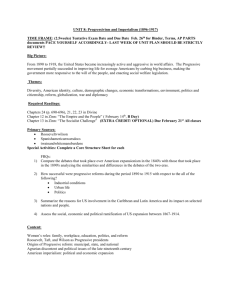Progressive Era
advertisement

1901 - 1917 Progressivism is an umbrella label for the economic, political, social, & moral reforms of the early 20th Century. Progressivism was a response to the industrial & urban excesses of the Gilded Age. Led by the urban well-educated middle class, the progressives aimed to eliminate government corruption, regulate business, address health hazards, and improve working conditions. In addition they sought to outlaw the sale of alcohol, put more political power in the hands of the people, & to gain for women the right to vote. Very simply, the Progressives sought “progress” in American society through government legislation at the federal, state, & local level. Muckrakers fueled the progressive movement by investigating & exposing problems to the American people through their articles, books, & cartoons. Thomas Nast – Through his cartoons, he exposed the political corruption of the Tammany Hall political led by Boss Tweed in New York City. As a result Tweed was convicted of embezzlement. Jacob Riis – Through his novel How the Other Half Lives (1890) he exposed the living conditions of the urban poor specifically in the tenements of NYC. As a result NYC passed building codes to promote safety and health. Ida B. Wells – Through her novel A Red Record (1895), she provided statistics on the lynching of African-Americans. As a result the NAACP joined the fight for Federal anti-lynching legislation. Frank Norris – Through his fictional novel The Octopus (1901)he exposed the monopolistic railroad practices in California. In Northern Securities v. U.S. (1904), the holding company controlling railroads in the Northwest was broken up. Ida Tarbell – Through her "History of Standard Oil Company” she exposed the ruthless tactics of the Standard Oil Company through a series of articles published in McClure's Magazine. In Standard Oil v. U.S. (1911), the company was declared a monopoly and broken up. Lincoln Steffens – Through his novel The Shame of the Cities (1904) he examined political corruption in cities across the United States. As a result, cities began to use city commissions and city managers. Upton Sinclair – Through his novel The Jungle (1906) he investigated dangerous working conditions and unsanitary procedures in the meat-packing industry. As a result, in 1906 the Meat Inspection Act and Pure Food and Drug Act were passed. Booker T. Washington - Former slave who founded the Tuskegee Institute that focused on teaching AfricanAmericans trade skills to earn a living and gain the trust of white society. W.E.B. DuBois - Founder of the NAACP, and a Harvard- educated professor who focused on the need for a traditional liberal arts education for African-Americans who could then insist upon equal treatment and rights from white society. Urban corruption from political machines led to the reorganization of local government using the: City Commissioner Plan – cities hired experts in different fields to run a single aspect of city government City Manager Plan – A city manager is hired to run each department of the city & report directly to the city council Reform governors such as Theodore Roosevelt (NY), Robert “Fighting Bob” LaFollete (WI), & Woodrow Wilson (NJ) as well as the Populist Party all pushed through reforms at the state level. Their goal was to make state governments more responsive to the people by encouraging citizens to get more involved in the political process. These reforms included: Secret Ballot – Ensured privacy at the ballot box to allow citizens to cast votes without party bosses knowing how they voted. Initiative – Allows voters to petition state legislatures to consider a bill desired by citizens. Referendum – Allows voters to decide if a bill or proposed amendment should be passed. Recall – Allows voters to petition to have an elected official removed from office. Direct Primary – Voters are able to select candidates to run for office, rather than party bosses selecting these candidates. Federal legislation was passed including: Newlands Reclamation Act (1902) – Encouraged conservation by allowing the building of dames & irrigation systems using money from the sale of public lands. Elkins Act (1902) – Outlawed the use of rebates by railroad officials or shippers. United States Forest Service (1905) – Manage the water & timber resources of the nation. Pure Food & Drug Act (1906/1911) – Required that companies accurately label the ingredients contained in processed food items. Meat Inspection Act (1906) – Required that meat processing plants be inspected to ensure the use of good meat & health-minded procedures. Hepburn Act (1906) – Strengthened the Interstate Commerce Commission allowing it to set maximum railroad rates. Federal Reserve Act (1913) – Created 12 district Federal Reserve Banks, each able to issue new currency & loan member banks funds at the prime interest rate, as established by the Federal Reserve Board. Department of Labor (1913) – Established as part of the executive department to promote the interests of labor. Clayton Antitrust Act (1914) – Strengthened the Sherman Antitrust Act by outlawing the creation of a monopoly through any means, & stated that unions were not subject to antitrust legislation. Federal Trade Act (1914) – Established the Federal Trade Commission, charged with investigating unfair business practices including monopolistic activity & inaccurate product labeling. 16th Amendment – Granted Congress the power to tax income. 17th Amendment – Provided for the direct election of U.S. Senators. 18th Amendment – Prohibited making, selling, or transporting alcohol. 19th Amendment – Provided women suffrage (right to vote) The struggle for women's suffrage dates back to the early 1800s. By the mid-1800s, women had become organized under the leadership of women such as Lucretia Mott, Elizabeth Cady Stanton, Susan B. Anthony. In 1848, suffragists organized the Seneca Falls Convention in upstate New York. There, Stanton composed the Declaration of Rights and Sentiments which was modeled after the Declaration of Independence. The Declaration of Rights and Sentiments contained several resolutions including that a man should not withhold a woman's rights, take her property or refuse to allow her to vote. Suffragists were greatly disappointed to learn that women were excluded from the Fifteenth Amendment that granted all men the right to vote. They continued to protest, march, and organize in the hope that they would soon be able to legally vote. Finally in 1920, the Nineteenth Amendment was passed which provided women with the right to vote. Florence Kelley – National Consumers League – fought for equal pay & an end to unfair treatment of women & children in the workplace. Margaret Sanger - Educated urban poor about the benefits of family planning through birth control. She founded the organization that became Planned Parenthood. Frances Willard – Women’s Christian Temperance Union – fought to end the use & abuse of alcohol, which they believed contributed to the evils of society. Jane Addams – Women’s Trade Union League – opened the Hull House, a settlement house in Chicago & fought for reform of public services in the city Lucy Burns & Alice Paul – Congressional Union for Women Suffrage – suffragettes that used radical tactics such as the hunger strike to call attention to women’s right to vote. The Temperance Movement began in the 1820s, and focused eliminating the use of alcoholic beverages. Alcohol consumption was seen as an amoral vice, particularly due to the rise of the saloon industry. Saloons introduced gambling and prostitution in an effort to entice customers and encourage them to drink more alcohol. Conservatives and Christians were outraged by this attack on orderly society. In 1874, Frances Willard formed the Women's Christian Temperance Union (WCTU) for the sole purpose of encouraging the prohibition of alcohol consumption. During the Progressive Era, the Eighteenth Amendment was passed in 1919. This banned the manufacture, sale, and transportation of alcohol in the United States. However, America did not stop drinking during the 1920s. In fact, if Prohibition was designed to stop amoral behavior it backfired. Bootlegging, the illegal manufacturing and selling of alcohol became incredibly profitable as underground bars called speakeasies stocked up on booze for their clientele. Bootlegging became its own criminal enterprise leading the establishment of organized crime with the likes of Al Capone in Chicago. Finally in 1933, the Twenty-first Amendment was passed which repealed the Eighteenth Amendment, ending Prohibition. Theodore Roosevelt 26th U.S. President (1901-1909) Progressive Record “Trust Buster” – Although more interested in “regulating” than “busting” trusts (powerful business combinations), Roosevelt was successful in regulating trusts to ensure business competition. One such example was his break up of the powerful Northern Railroad Securities company. Anthracite Coal Strike of 1902 – Roosevelt forced arbitration on a reluctant management & labor to resolve the strike that had a national impact. Promoted the idea of a “Square Deal” between labor & management much more so than any previous president. Progressive Record Conservation – Roosevelt set aside 190 million acres of land for national forests, coal & water reserves, & wildlife refuges. Also appointed Gifford Pinchot the head of the National Conservation Commission to promote proper use of the nation’s natural resources. Railroad Regulation – Through the Hepburn Act the Interstate Commerce Commission was granted the power to set maximum railroad rates. Regulating the Food Industry – His support led to the passage of the Pure Food & Drug Act & the Meat Inspection Act. William Howard Taft 27th U.S. President (1909-1913) Progressive Record “A True Trust Buster” – Taft had his Attorney General file 90 anti-trust cases as compared to 44 filed under Roosevelt. Further Regulation Placed telephone & telegraph companies under ICC jurisdiction. Prohibited interstate transportation of women for immoral purposes (White Slave Traffic Act) 16th Amendment was passed during his administration Election of 1912 Although Taft was Roosevelt’s hand picked successor, Roosevelt & Taft had a falling out due to Taft not being progressive enough. Despite this the “Old Guard” Republicans nominated Taft for President. As a result Roosevelt & the progressive members of the Republican Party split & formed the Bull Moose Party which nominated Roosevelt for President. Roosevelt touted his “New Nationalism” that was a more radical progressive reform agenda which stated that social justice could occur only through government intervention. Election of 1912 The Democrats nominated Woodrow Wilson. Wilson touted his “New Freedom” program that called for sweeping away privilege & restoring unfettered competition in business. Roosevelt & Taft essentially split the Republican vote allowing Wilson to become President Woodrow Wilson 28th U.S. President (1913-1921) Progressive Record Lowered tariffs (tax on imported goods) Federal Reserve Act (1913) that reorganized banking to protect American finances. Federal Trade Commission (1914)- regulated business & prosecuted unfair trade that could lead to a monopoly. Supported the Clayton Anti Trust Act a stronger law to regulate big business; exempted labor unions from the category of illegal combinations. Progressive Record Under Wilson’s direction Congress passed labor laws designed to ban child labor, shorten workdays, & to provided injury compensation to federal employees. Progressive Amendments 17, 18, & 19 were passed during his administration.





